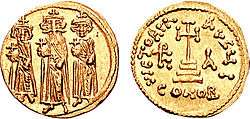Constantine III (Byzantine emperor)
| Constantine III | |||||
|---|---|---|---|---|---|
 Byzantine coin depicting, on its face, Constantine with his father Heraclius and brother Heraklonas | |||||
| Emperor of the Byzantine Empire | |||||
| Reign | February 641 – May 641 | ||||
| Predecessor | Heraclius | ||||
| Successor | Heraklonas | ||||
| Died | May 641 (aged 28 or 29) | ||||
| Spouse | Gregoria | ||||
| Issue |
Constans II Theodosius Manyanh | ||||
| |||||
| Dynasty | Heraclian Dynasty | ||||
| Father | Heraclius | ||||
| Mother | Eudokia | ||||
| Heraclian dynasty | |||
| Chronology | |||
| Heraclius | 610–641 | ||
| with Constantine III as co-emperor, 613–641 | |||
| Constantine III | 641 | ||
| with Heraklonas as co-emperor | |||
| Heraklonas | 641 | ||
| Constans II | 641–668 | ||
| with Constantine IV (654–668), Heraclius and Tiberius (659–668) as co-emperors | |||
| Constantine IV | 668–685 | ||
| with Heraclius and Tiberius (668–681), and Justinian II (681–685) as co-emperors | |||
| Justinian II | 685–695, 705–711 | ||
| with Tiberius as co-emperor, 706–711 | |||
| Succession | |||
| Preceded by Justinian dynasty and Phocas |
Followed by Twenty Years' Anarchy | ||
Constantine III (Greek: Κωνσταντῖνος Γ΄ Latin: Heraclius Novus Constantinus Augustus) (3 May 612 – 20 April or 24/26 May 641) was Byzantine Emperor for four months in 641. He was the eldest son of the Byzantine Emperor Heraclius and his first wife Eudokia.
Constantine's birth name was Heraclius Novus Constantinus, (Greek: Ἡράκλειος νέος Κωνσταντῖνος), which was also the official name under which he reigned. The name Constantine became established in later Byzantine texts as short for the Emperor and has become standard in modern historiography. In terms of official imperial nomenclature, the style "Constantine III" would be more appropriate for his son Constans II (r. 641–668).
Constantine was crowned co-emperor by his father on 22 January 613 and shortly after was betrothed to his cousin, Gregoria, a daughter of his father's first cousin, Nicetas. As the couple were second cousins, the marriage was technically incestuous, but this consideration must have been outweighed by the advantages of the match to the family as a whole. Furthermore, its illegality paled into insignificance beside Heraclius' marriage to his niece Martina the same year. In comparison, Constantine's marriage was far less scandalous than that of his father's.
Constantine and Gregoria married in 629 or perhaps early 630 and in that year their first child, Constans II was born. Their second child was another son, Theodosius. They also had a daughter named Manyanh who later married the last Sassanid King of Persia, Yazdgerd III and had issue.
Constantine became senior Emperor when his father died in 641. He reigned together with his younger half-brother Heraklonas, the son of Martina. His supporters feared action against him on the part of Martina and Heraklonas, and the treasurer Philagrius advised him to write to the army, informing them that he was dying and asking for their assistance in protecting the rights of his children. He also sent a vast sum of money, more than two million solidi (gold coins), to Valentinus, an adjutant of Philagrius, to distribute to the soldiers to persuade them to secure the succession for his sons after his death. Indeed, he died of tuberculosis after only four months, leaving Heraklonas sole emperor. A rumor that Martina had him poisoned led first to the imposition of Constans II as co-emperor and then to the deposition, mutilation, and banishment of Martina and her sons.
Family
By his wife Gregoria, the daughter of Niketas, Constantine III had two sons and a daughter:
- Constans II, who succeeded as emperor
- Theodosius
- Manyanh, who married Yazdgerd III, last Sassanid Emperor of Persia
See also
References
Literature
- Ostrogorsky, George (1956). History of the Byzantine State. Oxford: Basil Blackwell.
- The Oxford Dictionary of Byzantium, Oxford University Press, 1991.
| Wikimedia Commons has media related to Heraclius Constantine. |
| Constantine III (Byzantine emperor) Born: 3 May 612 Died: 20 April or 24/26 May 641 | ||
| Regnal titles | ||
|---|---|---|
| Preceded by Heraclius |
Byzantine Emperor 613–641 with Heraclius, 613–641 Heraklonas, 641 |
Succeeded by Heraklonas |